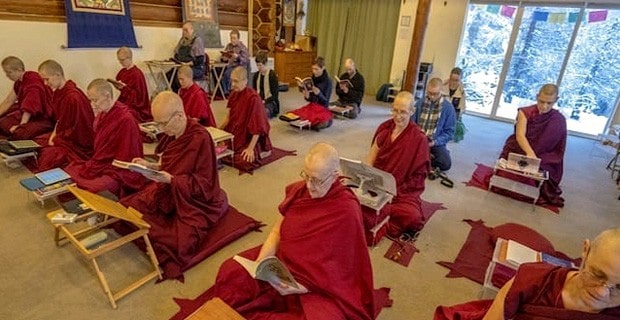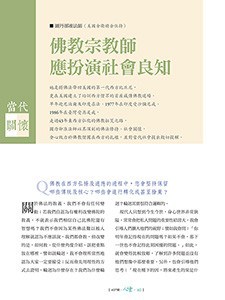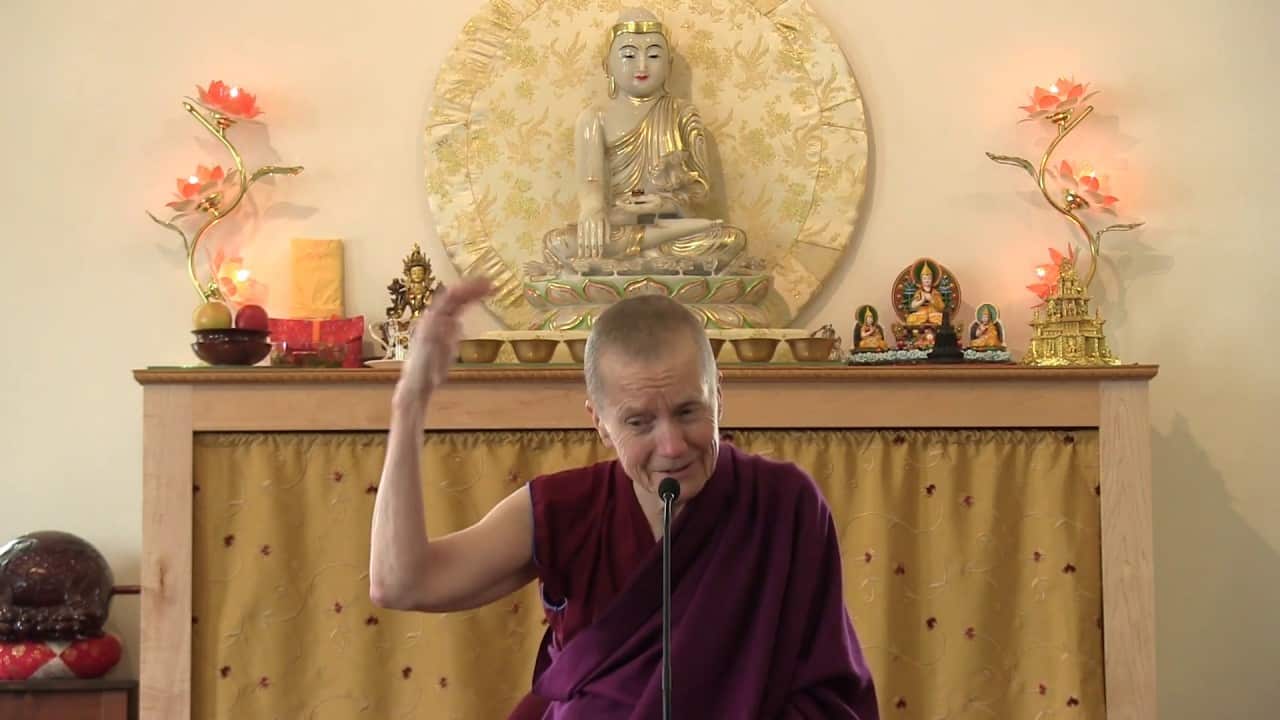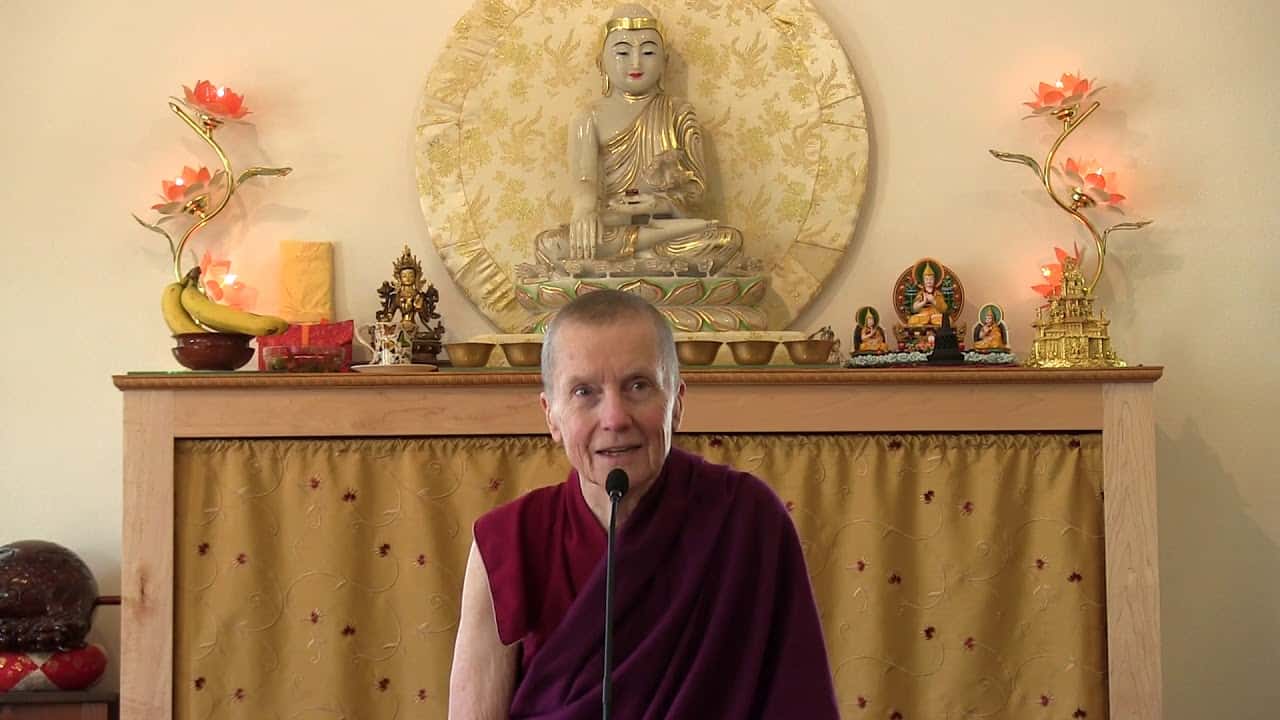Buddhist religious practitioners should serve as society’s conscience

This interview with Venerable Thubten Chodron was published in Dharma Drum Mountain's magazine Humanity, February 1, 2019.
Foreword: She is one of the first generation of Western bhikshunis who brought the Buddhadharma back to the US, and then went on to establish one of the first Tibetan Buddhist training monasteries for Westerners in America. After spending her early years seeking the Dharma in Nepal and India, she received srameneri ordination in India in 1977 and full ordination in Taiwan in 1986. Having spent 43 years in both East and West opening up new frontiers for the Buddha’s teachings, Venerable Thubten Chodron brings her deep practice of the Buddhadharma and concern for society into her wholehearted efforts to establish the Buddhist sangha community in the West, and also raises emphatic reminders for contemporary society to reflect upon.
[Interview by Yanzhen Shi of Dharma Drum Mountain’s Humanity magazine]
Yanzhen Shi (YS): In the process of the spread and adaptation of the Buddhadharma to the West, what Buddhist traditions and core principles have you sought to uphold and preserve? Which ones have you had to change, or even discard?
Venerable Thubten Chodron (VTC): We have not changed anything in terms of the teachings of the Buddhadharma. If we think that we have the authority to change the Buddha’s teachings, doesn’t that suggest that we believe we have more wisdom than the Buddha? Just because some aspects of the Buddhadharma are difficult for people to understand doesn’t mean that we shouldn’t speak about them. We teach everything, but what we change is how we teach, what angle we introduce the teachings from, and what we might emphasize. For instance when talking about rebirth in cyclic existence, I don’t take it for granted that everyone has to accept this idea. Instead, I first use reasoning to prove, why does rebirth exist? Why do we take rebirth? The idea of rebirth is actually very logical.
Modern people think only about this life, so their perspective is very narrow, and often they exaggerate the importance of their personal problems. I advise people to expand their outlook; for example I ask them, “Next year, will you remember the problems you have now? If you won’t, then in your next life, you also won’t remember the problems you’re obsessed with at this moment.” Thinking in this way, people become more relaxed and see that many of their problems are not as important as they think they are. Also, I advise people to consider, “What effects will the causes that I create now produce?” In this way, I guide students to practice virtue, instead of getting angry over the same old trivial matters and creating negative karma.
If the other party really cannot accept the idea of rebirth, that’s fine. They can put it aside temporarily and think about it later. I tell them not to reject the entirety of the Buddha’s teachings just because they don’t understand rebirth at the moment. They can still benefit from many other aspects of Buddhism.
Separately, I do make changes that are cultural, such as introducing gender equality. In Indian society during the Buddha’s time, almost every aspect of women’s lives were controlled by men. Now in the 21st century, especially in the US, everyone wishes for gender equality, for opportunities to be given to everyone equally, so I also bring such concepts into our monastery.
YS: With regard to teaching the Dharma in the West, do most people mind when male students follow a female teacher in their spiritual practice?
VTC: This is more widely accepted in the West. Of course, there are some people who aren’t used to this, then they wouldn’t come to our monastery. However, there are men who don’t mind; what they care about more is the teacher’s inner qualities, and not their outer appearance or image. In my tradition, almost all spiritual mentors are male, but in any teacher-student relationship, what we have to pay attention to is not becoming attached. If the teacher and student are of different genders, they especially have to maintain a respectful distance.
At present there is one bhikshu at our monastery, and there are many male professionals amongst my students, such as lawyers, businessmen, and so on. They don’t care that their teacher is female. In Western society, Western Buddhists have more individual space, but within the Tibetan Buddhist tradition it’s still more difficult for female monastics to teach the Dharma, women teachers are very rare. Nonetheless, this is gradually changing, now that the geshe degree is available to women, female Dharma teachers will gradually come forward to teach.
YS: When a male monastic joined your originally all-female monastic community to live and practice together, did that bring about any inconveniences or need for adjustment?
VTC: Things are going well, there haven’t been problems. The bhikshu in our community has ten sisters, so he’s used to being around many women.
In the West, there are very few monasteries, there are mostly Dharma centers led by laypeople. By comparison, we are a monastic community. We keep precepts, we do the bimonthly confession (posadha), and we are much stricter in our behavior. Of course, our male and female living quarters are completely separate.
In addition, when lining up in ordination order, we do so solely according to our length of ordination. Someone doesn’t stand in front just because he is male, and we don’t line up separately by gender. The bhikshu in our community is younger in ordination, so he stands towards the back. For him this is not a problem, he can completely understand and accept how we run our monastic community in this way.
YS: Many people expect to be able to apply the Buddhadharma in response to the various difficulties and unprecedented challenges that we face in modern society. As religious practitioners, how can we offer support in this regard?
VTC: The greatest problem in the US now is the animosity between people who have different viewpoints, as well as racism and bigotry. Many people feel disappointed and angry about the current president and his policies, so we try to help them settle their emotions and offer guidance on how to have a calm mind while still participating in the democratic process. We must not become complacent but must do what we can to contribute to creating a peaceful and fair society.
In recent years, we’ve been teaching the public how to overcome their afflictions and not to feel despair because the current situation isn’t going according to their wishes. We encourage people to try to expand their outlook and to understand the views of others, not to use harsh speech, but instead to think about how to cooperate with others and create greater harmony in society.
We post a short Dharma talk on the web every day. Sometimes we teach the Dharma based on scriptural texts, and sometimes we also discuss social policies and problems, such as climate change, how to settle the influx of migrants, same sex marriage, lack of gun control, and so on. We speak to the public about Buddhist values and principles and how to apply them to problems in society so that we can create more peace in society. We also teach them how to generate a good motivation—one of love, compassion, and fortitude—so they can contribute to society in whatever way they can, for instance by tutoring underprivileged children, working in a soup kitchen, supporting organizations that provide housing for migrants, and so forth.
YS: When discussing contentious political or social issues, do you clearly state your position?
VYC: Yes, we clearly express our Buddhist values and how we apply them to policy issues. For example, hoping for more gun control, opposing sexual abuse and violence, supporting the #MeToo movement, believing in the existence of climate change… We express our beliefs directly, and encourage the public in society to pay attention to these problems. However, we do not tell people whom to vote for.
YS: What are your views about same-sex marriage?
VTC: In Western society, many homosexuals have experienced rejection from their churches and Christian communities. They have turned to embrace Buddhism as the majority of Western Buddhists are more liberal and more tolerant, open-minded, and accepting of homosexuality. If we reject homosexuals, this would be very cruel. It will cause them to get hurt again, because the religious environment that they grew up in from childhood has constantly rejected them. We cannot take such an uncompassionate position. At present, most Americans can accept same-sex marriage and it has been legalized, so the controversy about this issue is not as manifest as before.
In the US, abortion is actually a more controversial issue. Clearly, Buddhism does not approve of abortion, because it involves taking life. Yet, we can’t be like some conservative people, who are strongly opposed even to contraception, which is another extreme. Personally, I don’t agree with handling the entire matter politically, which has caused a lot of suffering. In cases of unwanted pregnancy, the mother, the father, the baby—everyone involved—needs compassion. Once this becomes a matter of political debate, everyone argues and scolds each other, which only increases the suffering of the people involved. We should give them some personal space to make their choice.
I would encourage the pregnant person to give birth to the child, and then afterwards give up the child for adoption, but that is my personal view. My little sister is adopted. I love her very much and I am so happy that her birth mother gave her for adoption, so that she became part of our family.
Although some people think that these are political issues and that it’s not appropriate for monastics to discuss them, my view is that these are not political issues but ethical issues. As religious practitioners we have to point society in an ethical direction, so we express our views.
YS: Aside from viewing social issues from an ethical perspective, do you explain them from other perspectives as well?
VTC: For me, ethical conduct encompasses everything. We cannot separate the way the government operates from ethical behavior. For instance, at present, the Republican Party wishes to reduce welfare benefits and medical support for the poor. This appears to be a political discussion, but to me, it’s an ethical issue. The way in which people treat each other is an ethical issue.
Additionally, our relationship with other countries and foreign policy are also ethical issues. For example, many American politicians are indifferent to human rights violations in our own and other countries. When we see such things happening, can we say that as monastics we don’t participate in politics, so it’s none of our business? We should step forward to bring compassion into the discussion and make our position clear.
To give an example that relates to daily life, if the things that we use daily at the monastery cannot be recycled, it will result in environmental destruction. This is also an ethical issue, because it involves the well-being of living beings on this planet. Everything in life is related to ethical conduct and integrity.
YS: There are issues we are about to face in the future for which there are no ethical guidelines at present, such as the development of artificial intelligence. How should we respond?
VTC: We should think about the ethical principles related to these issues now. I think about how in the past when the atomic bomb was developed, scientists at that time were infatuated with this amazing intellectual breakthrough and its glory; they didn’t think that it would have such terrifying results subsequently. This is our responsibility as religious practitioners, we have to remind the public to think about ethical effects of our present research and development projects.
Modern people are becoming increasingly infatuated with technological gadgets, and interpersonal relationships have grown increasingly estranged. As Buddhists, and especially as monastics, we should play the role of society’s conscience, pointing out the direction that society should move in. We have to remind everyone to pause and reflect, and to consider the results of our actions and inventions on other living beings and future generations. Especially when the public swarms like bees towards new and interesting technological developments, it becomes all the more important for us to think about their results.
YS: Aside from giving Dharma talks and guidance on how to think about contemporary situations, what other activities does your monastery offer to connect with the laity?
VTC: There are many Dharma centers in the US that already offer a great variety of activities for laypeople. However, there are very few monasteries in the US, so our monastery’s mission is to provide education for the monastics. We seek to enable monastics to have a deeper understanding of the meaning and principles of the Buddhadharma, to practice the Buddhadharma more deeply, and then they can share the Buddhadharma. So our goal is very clear, our focus is on monastics, and in that way, we’re different from a typical Dharma center.
Nonetheless, we organize many courses and retreats each year that are open to laypeople, allowing them to practice together with us. At other times, they can also visit and participate in our monastic schedule. We post short daily Dharma talks on the Internet, which lay people like a lot. Every week, we livestream two Dharma teachings, and teach a meditation class in a nearby city. Once a month, we have Sharing the Dharma Day, an all-day program especially for people who are new to the Buddha’s teachings, and during our three-month winter retreat, we invite lay people to participate as well.



